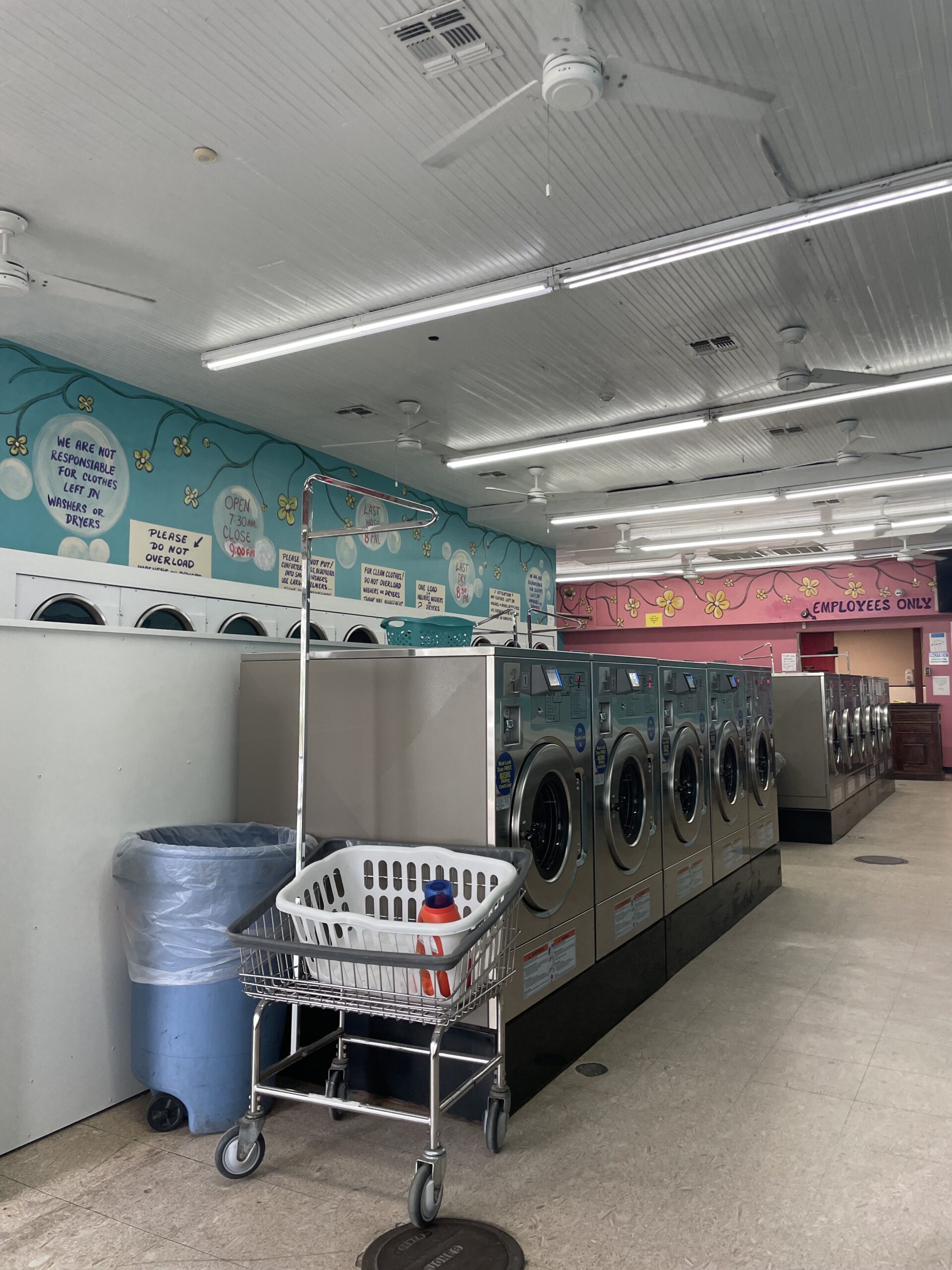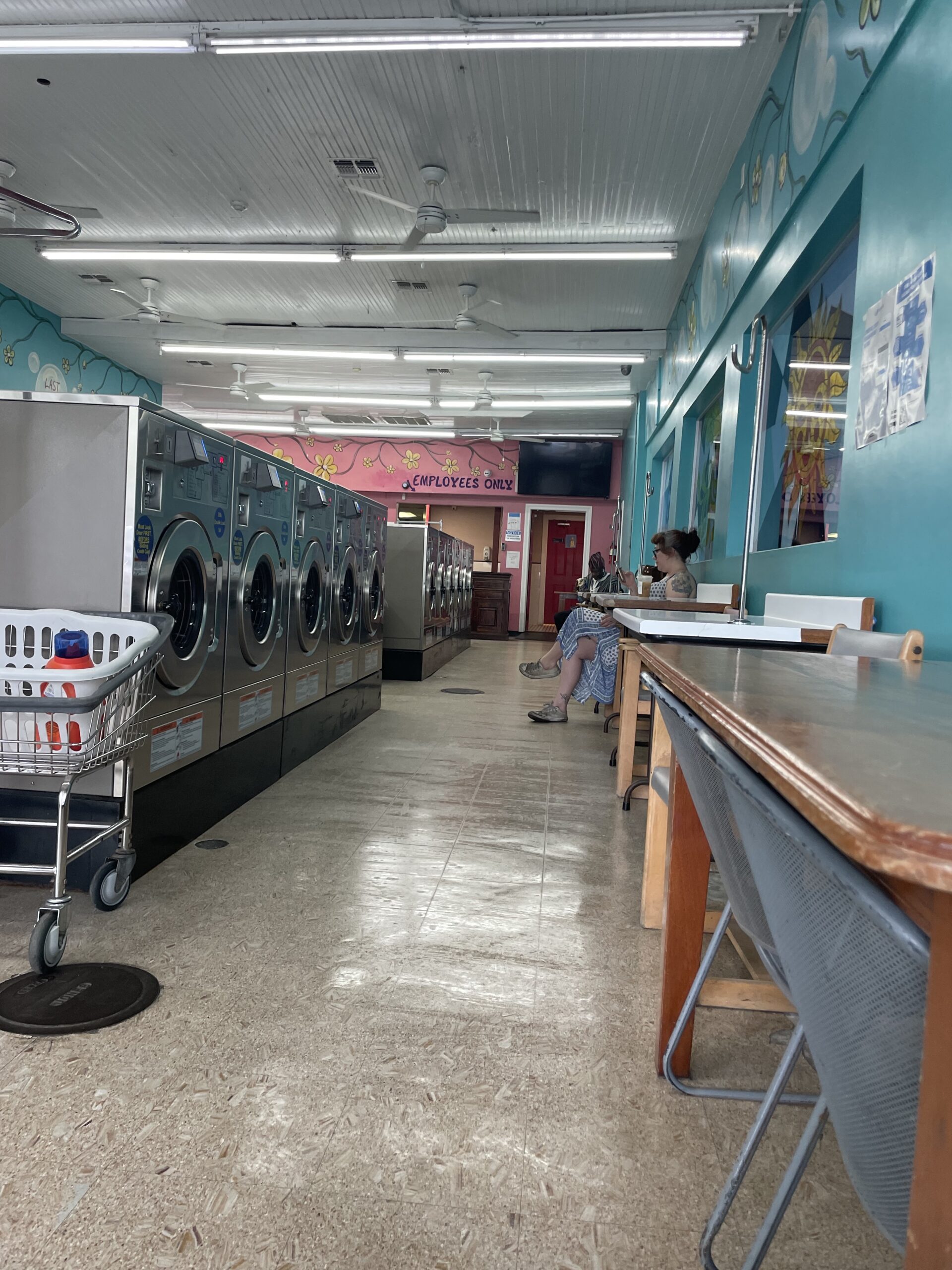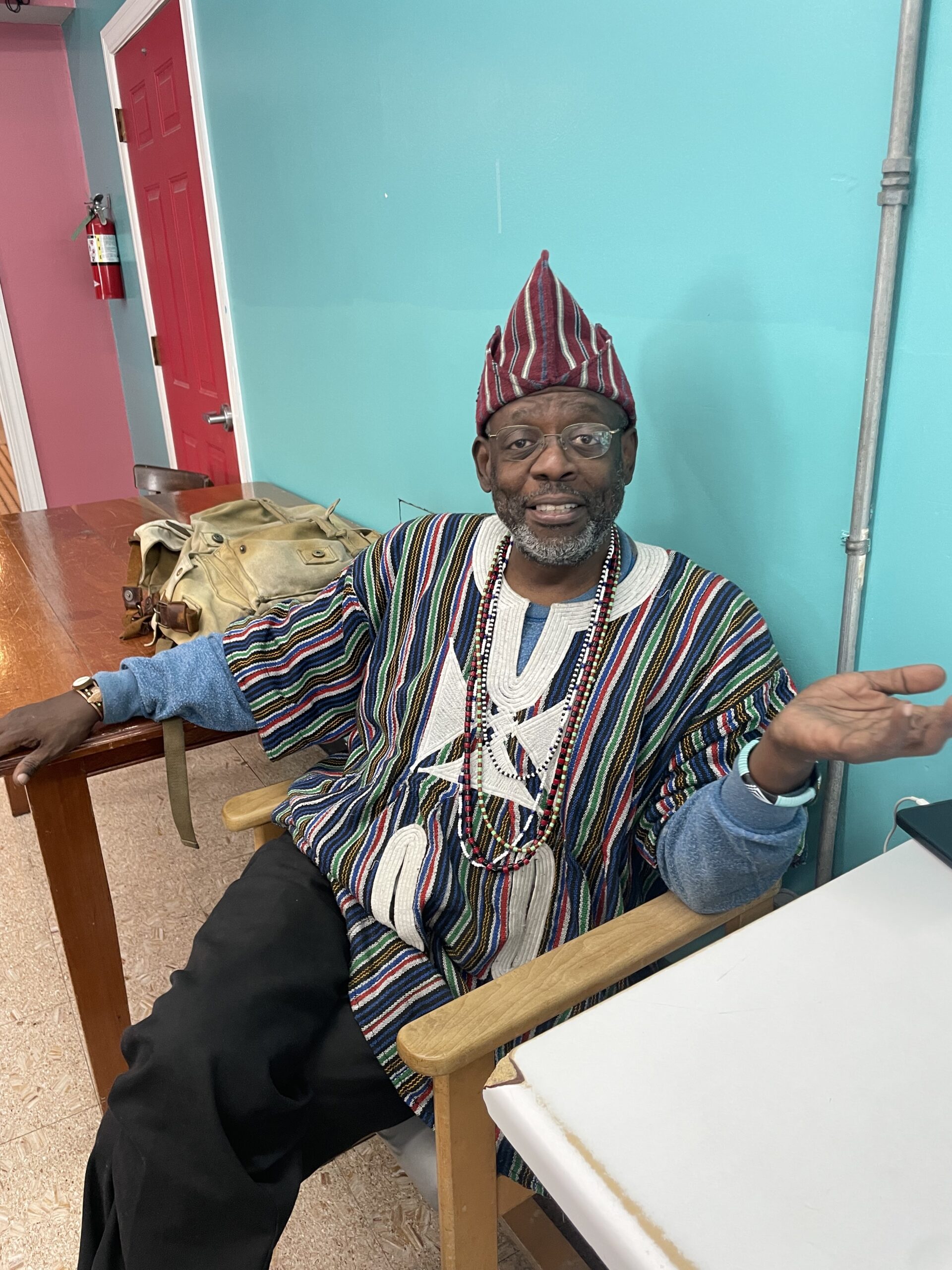By: Adrianna Goldman
 On April 15 at 9 a.m., Luisa Martinez, a Honduran employee at the Babylon Laundromat on Maple Street in Uptown, New Orleans, mops and dusts, while several customers walk in and out of the store. The Babylon Laundromat is beautifully painted, in bright teal and pink, and operates from 6:30 a.m. to 10 p.m. every day.
On April 15 at 9 a.m., Luisa Martinez, a Honduran employee at the Babylon Laundromat on Maple Street in Uptown, New Orleans, mops and dusts, while several customers walk in and out of the store. The Babylon Laundromat is beautifully painted, in bright teal and pink, and operates from 6:30 a.m. to 10 p.m. every day.
The owner, Sherif Sakla, has been running the facility since 1994, in an area that he describes as “a bubble.” Despite being in a high-income area, the Babylon Laundromat primarily serves minority, lower, and middle-income groups, and Tulane and Loyola University students.
Maple Street is a lively neighborhood, filled with an array of restaurants, coffee shops, bars, and boutiques. The Babylon Laundromat’s customers can enjoy these establishments while waiting for their laundry. Sakla “strives to offer a clean and well-maintained coin-operated laundry facility.”
Martinez, who resides 25 minutes away in Kenner, has only been working at the Babylon Laundromat for six months. Although she has a challenging time communicating with customers in English, as it is not her native language, she already feels a sense of community at the store. When asked if she frequently interacts with customers, she replies in Spanish that she is able to successfully assist customers who may need help while doing their laundry. She says that “the minimum time to wash clothes is 29 minutes and the maximum is 35 minutes depending on the machine [and] to dry clothes it takes between 20 minutes to 40 minutes depending on the machine.” Furthermore, she speaks very highly of her boss, Sakla, and says that he is an excellent person and treats her very well.
Sakla hires “based on willingness and ability to work and serve customers.” He likes to give an “opportunity to underprivileged individuals” if he can. Also, Sakla is readily available to speak and interact with customers, whether he is in the store or behind the Ring camera. Pressing the button on the Ring camera at the employee services desk will provide customers with a practically immediate response from Sakla himself.
A Man of Many Talents
While the Babylon Laundromat appears to be a very conventional laundromat, the owner is not a conventional man. Sherif Sakla is a man of many talents. He immigrated to Uptown, New Orleans in 1980 and is a former emergency physician and current law attorney. Sakla studied medicine for seven years in Cairo, Egypt, and went on to complete four years of post-graduate training and residency. He later decided to do three years of night law school. When he moved to “the bubble,” a phrase given to the Uptown area by his son Alex, he got involved in providing laundromat services by “near accident.”
Even though Sakla did not grow up using a laundromat, he has created a remarkably prosperous side hustle. Sakla initially purchased the Menier’s Hardware store, which served the Uptown area for more than 50 years, for investment purposes. The building “was no longer a hardware store [and] it needed lots of repairs and restorations,” so he turned it into the Babylon Laundromat. Sakla recalls a time when the former laundromat, located where Satsuma is today, was poorly run. Since Maple Street is such a vibrant area, he felt that he could make a better “mouse trap” as he describes it, by providing early morning to late evening laundry services to community members. Sakla takes pride in the way his laundromat is located in “a nice location for people to get together.” He has really grown to enjoy providing his community with an essential service. 
Some customers have been frustrated with the increase in prices over the years, but Sakla says he works hard to keep pricing stable, while still being competitive with other laundromats, because he wants to make sure that his customers can continue to “take care of their business.” Despite the fact that the machines he has installed are the most expensive commercial machines, he says prices have remained constant for the past five years. Sakla charges 20 cents per pound, which he says is reasonable for the area. Loyola student Jackie Mutter claims that “when you are coming every week, it is a little pricey, but not too bad.”
The Regulars
Mutter has been a regular customer for the last eight months and conveniently lives right across the street from the Babylon Laundromat. Although she waits around her house while her laundry gets done, she does feel like there is a sense of community at the laundromat. She explains how she is “an introvert and a little bit of a shy person” but notices “a lot of people talking,” even if she is “not always one to start a conversation.”
Gloria Lee Love, another regular, says that she feels as though there is a “little community” since she and the other customers alike “are all people who need a laundromat.” However, much like Mutter, she does not tend to interact with other customers. She normally “walk[s] around the block” or plays on her phone while she waits. Even though Love wishes that she had laundry at her house, she supposes that “the laundromat is kind of fun” and thinks that it is nice to have the Babylon Laundromat as an option.
Pablo Diaz has been using the Babylon Laundromat for the past four years. Diaz is soft-spoken, with a prominent goatee. He usually reads while he waits for his laundry. Being from Honduras, just like Martinez, he doesn’t interact with other customers due to the language barrier. However, he enjoys going there, as he lives close by and appreciates a change of scenery.
Norlean, “like New Orleans,” is an older woman who lives about a mile from the laundromat. She wears tiny glasses and patiently waits at one of the many desks around the store, as she watches her laundry move around in circles. Although she is not a woman of many words, she says that she will “talk to anybody.” Norlean goes to the laundromat every week and has been there since before Sakla became the owner. Her face lights up with excitement, when she explains how “the dryers don’t break as much” and there are not nearly as many issues as there used to be, since Sakla installed reliable machinery less than two years ago. However, she does recognize a change in price from 30 years ago. Naturally, prices change with the times and Norlean understands this. She says, “You have to do what you have to do. His prices are his prices.”
 Some people don’t just use the Babylon Laundromat for its laundry services. Some like to enjoy Babylon’s “good atmosphere” for other purposes. Adé Awo Afùwàpé, a New Orleans native and former journalist for the country’s longest-running Black newspaper, the Louisiana Weekly, hardly ever comes in to do his laundry. He normally uses the laundromat for its other amenities. Afùwàpé says, “Because I live so close, I’m not actually here to wash clothes. I’m charging my phone, and sometimes I use the restroom.”
Some people don’t just use the Babylon Laundromat for its laundry services. Some like to enjoy Babylon’s “good atmosphere” for other purposes. Adé Awo Afùwàpé, a New Orleans native and former journalist for the country’s longest-running Black newspaper, the Louisiana Weekly, hardly ever comes in to do his laundry. He normally uses the laundromat for its other amenities. Afùwàpé says, “Because I live so close, I’m not actually here to wash clothes. I’m charging my phone, and sometimes I use the restroom.”
Afùwàpé refers to himself as an “interesting character.” He says he is a part of an ancient African “society” and is knowledgeable about practically everything. He is a Gemini who is well-versed in astrology and history, including African tradition and Judaism. He calls himself a “professional student,” as he is passionate about learning and people-watching. He sits at the desk in the very back of the store, which allows him to get the best view of the customers who walk in and out. Afùwàpé finds the laundromat interesting because “it is kind of the least bourgeois-bougie thing on the block.” Afùwàpé does not mind kicking back and getting comfortable for a while.
By 10:45 a.m., ten people have already “aired out their dirty laundry”—literally and perhaps metaphysically, by using their laundry time as their own downtime, to mentally organize themselves. Coins, one-by-one, have been dropping into the slots of the machines, filling the silence of the store and waking up the tired customers. The ATM machine spits out cash and carts full of clothes roll around the store. Afùwàpé’s phone battery fully charged, he unplugs his cord, grabs his bag, and rides off on his black and white motorcycle. Martinez, who has been there since 6 a.m., walks out at the same time as Afùwàpé with trash bags in both hands; she begins clearing the clutter and getting ready to go home.
 NOLAbeings Multimedia artist Claire Bangser created NOLAbeings as a portrait-based story project that marries...
NOLAbeings Multimedia artist Claire Bangser created NOLAbeings as a portrait-based story project that marries...  Voodoo in New Orleans: Reviving history: New Orleans fortune telling This article takes a deep dive into the history of Voodoo in New Orleans, its hybridization with Catholicism, and its present-day place in the city's culture. The author visits fortune-tellers in the French Quarter, using their guidance as a tool for introspection rather than a deterministic predictor of the future. Through her experiences in New Orleans, the author feels a mystical connection to both the past and the future.
Voodoo in New Orleans: Reviving history: New Orleans fortune telling This article takes a deep dive into the history of Voodoo in New Orleans, its hybridization with Catholicism, and its present-day place in the city's culture. The author visits fortune-tellers in the French Quarter, using their guidance as a tool for introspection rather than a deterministic predictor of the future. Through her experiences in New Orleans, the author feels a mystical connection to both the past and the future. 